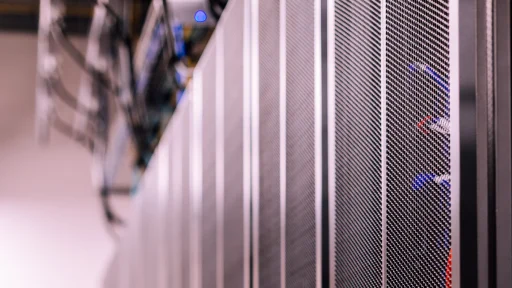The data center market refers to the industry that provides physical infrastructure and services for storing, processing, and managing large amounts of data. In the digital age, data centers play a crucial role in supporting the growing demand for data storage and processing capabilities. They are essential for businesses and organizations that rely on technology to store and analyze data, run applications, and deliver services to their customers.
Data centers have a long history that dates back to the early days of computing. In the 1960s, large mainframe computers required dedicated rooms with specialized cooling and power systems to operate. These rooms eventually evolved into what we now know as data centers. Over the years, data centers have become more sophisticated and efficient, with advancements in technology enabling higher densities of computing power in smaller spaces.
Key Takeaways
- The data center market is a rapidly growing industry that provides critical infrastructure for businesses and organizations.
- Key players in the data center market include Amazon Web Services, Microsoft, and Google, among others.
- Challenges in the data center market include rising energy costs, security concerns, and the need for constant upgrades and maintenance.
- Opportunities in the data center market include the adoption of emerging technologies such as artificial intelligence and the Internet of Things.
- The future outlook for the data center market is positive, with continued growth and innovation expected in the coming years.
Growth and Trends in the Data Center Market
The data center market is currently experiencing significant growth due to the increasing demand for digital services and the proliferation of connected devices. According to a report by MarketsandMarkets, the global data center market is expected to grow from $40.32 billion in 2017 to $77.18 billion by 2022, at a compound annual growth rate (CAGR) of 13.7%.
Several trends are driving this growth in the data center market. One of the key trends is the rise of cloud computing. Cloud computing allows businesses to access computing resources on-demand over the internet, eliminating the need for on-premises infrastructure. This has led to a shift from traditional data centers to cloud-based solutions, which offer scalability, flexibility, and cost savings.
Another trend driving growth in the data center market is the increasing adoption of big data analytics. As businesses collect and analyze large volumes of data, they require more storage and processing capabilities. Data centers provide the infrastructure needed to handle these massive amounts of data and enable real-time analytics.
Key Players in the Data Center Market
The data center market is highly competitive, with several major players dominating the industry. Some of the key players in the market include Amazon Web Services (AWS), Microsoft Azure, Google Cloud, IBM, and Oracle. These companies offer a range of services, including infrastructure-as-a-service (IaaS), platform-as-a-service (PaaS), and software-as-a-service (SaaS).
Amazon Web Services (AWS) is currently the largest player in the data center market, with a significant market share. AWS offers a wide range of cloud services, including compute power, storage, and databases. Microsoft Azure is another major player, providing a comprehensive suite of cloud services for businesses of all sizes. Google Cloud and IBM also have a significant presence in the market, offering cloud computing solutions and AI capabilities.
Challenges in the Data Center Market
While the data center market presents significant opportunities for growth, it also faces several challenges. One of the main challenges is rising energy costs. Data centers consume a large amount of electricity to power and cool their infrastructure. As energy prices continue to rise, data center operators are under pressure to find more energy-efficient solutions to reduce costs and minimize their environmental impact.
Another challenge in the data center market is related to infrastructure and design. Data centers require specialized facilities with redundant power supplies, cooling systems, and physical security measures. Designing and building these facilities can be complex and costly. Additionally, as technology advances and computing demands increase, data centers need to continually upgrade their infrastructure to keep up with the latest requirements.
Opportunities in the Data Center Market
Despite the challenges, there are several opportunities in the data center market that can drive growth and innovation. One of the key opportunities is the growth potential in emerging markets. As more countries around the world embrace digital transformation, there is a growing demand for data center services. Emerging markets such as India, China, and Brazil offer significant growth opportunities for data center operators.
Another opportunity in the data center market is related to cloud computing. As businesses increasingly adopt cloud-based solutions, there is a growing need for data centers to support these services. Cloud computing offers scalability, flexibility, and cost savings, making it an attractive option for businesses of all sizes. Data center operators can capitalize on this trend by offering cloud services and partnering with cloud providers.
The Impact of Cloud Computing on the Data Center Market


Cloud computing has had a significant impact on the data center market, transforming the way businesses store, process, and manage data. Cloud computing allows businesses to access computing resources on-demand over the internet, eliminating the need for on-premises infrastructure. This has led to a shift from traditional data centers to cloud-based solutions.
The growth of cloud computing has also had an impact on data center infrastructure. Traditional data centers were designed to support a specific workload and had limited scalability. With cloud computing, data centers need to be able to handle fluctuating workloads and scale up or down as needed. This has led to the development of hyper-scale data centers that can support massive amounts of computing power.
While cloud computing presents opportunities for data center operators, it also brings challenges. One of the main challenges is related to security and privacy. With data being stored and processed in the cloud, there is a need for robust security measures to protect sensitive information. Data center operators need to invest in advanced security technologies and implement strict access controls to ensure the confidentiality and integrity of their customers’ data.
Data Center Infrastructure and Design
Data center infrastructure refers to the physical components that make up a data center, including servers, storage devices, networking equipment, cooling systems, and power distribution units. Designing an efficient and reliable data center infrastructure is crucial for ensuring optimal performance and minimizing downtime.
Key components of data center infrastructure include:
– Servers: These are the computers that process and store data. Data centers typically have racks of servers that are connected to each other and to the network.
– Storage devices: These are used to store data, such as hard disk drives (HDDs) and solid-state drives (SSDs). Data centers often use redundant storage systems to ensure data availability.
– Networking equipment: This includes switches, routers, and firewalls that enable communication between servers and the outside world. Data centers need high-speed and reliable networking infrastructure to handle large amounts of data traffic.
– Cooling systems: Data centers generate a significant amount of heat, so cooling systems are essential to maintain optimal operating temperatures. This can include air conditioning units, liquid cooling systems, or even immersion cooling technologies.
– Power distribution units (PDUs): These devices distribute power to the servers and other equipment in the data center. Redundant power supplies and backup generators are often used to ensure uninterrupted power supply.
Best practices for data center design include:
– Redundancy: Data centers should have redundant systems in place to minimize the risk of downtime. This includes redundant power supplies, cooling systems, and network connections.
– Scalability: Data centers should be designed with scalability in mind, allowing for easy expansion as computing demands increase. This can include modular designs that can be easily expanded or upgraded.
– Energy efficiency: Data centers consume a significant amount of energy, so it is important to design for energy efficiency. This can include using energy-efficient hardware, implementing efficient cooling systems, and optimizing server utilization.
Security and Compliance in the Data Center Market
Security is a critical concern in the data center market, as data centers store and process sensitive information for businesses and organizations. Data center operators need to implement robust security measures to protect against unauthorized access, data breaches, and other security threats.
Data center security measures can include:
– Physical security: Data centers should have strict access controls, including biometric authentication, surveillance cameras, and security guards. Only authorized personnel should be allowed to enter the data center.
– Network security: Data centers should have firewalls, intrusion detection systems, and other network security measures in place to protect against cyber threats. Regular security audits and vulnerability assessments should also be conducted.
– Data encryption: Data should be encrypted both at rest and in transit to protect against unauthorized access. This can include using encryption algorithms and secure communication protocols.
Compliance regulations also play a significant role in the data center market. Many industries, such as healthcare and finance, have strict regulations regarding the storage and processing of data. Data center operators need to ensure that their facilities and processes comply with these regulations to avoid legal and financial consequences.
Emerging Technologies in the Data Center Market
The data center market is constantly evolving, driven by advancements in technology. Several emerging technologies are expected to have a significant impact on the data center market in the coming years.
One of these technologies is artificial intelligence (AI) and machine learning (ML). AI and ML can be used to optimize data center operations, improve energy efficiency, and enhance security. For example, AI algorithms can analyze data center performance metrics in real-time and make adjustments to optimize energy usage. ML algorithms can also be used to detect anomalies and potential security threats.
Another emerging technology in the data center market is edge computing. Edge computing brings computing power closer to the source of data generation, reducing latency and improving performance for applications that require real-time processing. This can include applications such as autonomous vehicles, smart cities, and industrial IoT.
Future Outlook for the Data Center Market
The future outlook for the data center market is promising, with continued growth expected in the coming years. The increasing demand for digital services, the proliferation of connected devices, and advancements in technology will continue to drive the growth of the data center market.
According to a report by Grand View Research, the global data center market is projected to reach $284.44 billion by 2028, growing at a CAGR of 7.7% from 2021 to 2028. This growth will be driven by factors such as the increasing adoption of cloud computing, the rise of big data analytics, and the need for scalable and secure data storage solutions.
However, data center operators will also face challenges in the future. Rising energy costs, increasing regulatory compliance requirements, and the need for continuous infrastructure upgrades will require data center operators to innovate and adapt to stay competitive.
In conclusion, the data center market plays a crucial role in supporting the growing demand for data storage and processing capabilities in the digital age. The market is currently experiencing significant growth, driven by trends such as cloud computing and big data analytics. While there are challenges in the market, there are also opportunities for growth and innovation. Data center operators need to stay ahead of emerging technologies and trends to capitalize on these opportunities and overcome the challenges they face.
If you’re interested in learning more about the future of computing, you should definitely check out this informative article on Understanding Edge Computing: The Future of Computing. It delves into the concept of edge computing and how it is revolutionizing the data center market. With the rise of IoT devices and the need for real-time processing, edge computing offers a decentralized approach that brings computation closer to the source of data generation. This article explores the benefits, challenges, and opportunities associated with this emerging trend.
FAQs
What is the data center market?
The data center market refers to the industry that provides physical space, power, and cooling for the storage and processing of digital data.
What are the current trends in the data center market?
Current trends in the data center market include the adoption of cloud computing, the use of artificial intelligence and machine learning, the growth of edge computing, and the increasing demand for renewable energy sources.
What are the challenges facing the data center market?
Challenges facing the data center market include the high cost of building and maintaining data centers, the need for skilled personnel to manage and operate them, and the increasing demand for energy-efficient and sustainable solutions.
What are the opportunities in the data center market?
Opportunities in the data center market include the potential for growth in emerging markets, the development of new technologies and services, and the increasing demand for data storage and processing capabilities.
What is the impact of cloud computing on the data center market?
Cloud computing has had a significant impact on the data center market, as it has led to the consolidation of data center infrastructure and the growth of hyperscale data centers. It has also increased the demand for data center services and created new opportunities for data center providers.
What is edge computing and how is it affecting the data center market?
Edge computing refers to the processing of data at or near the source of the data, rather than in a centralized data center. This trend is affecting the data center market by creating new opportunities for smaller, more distributed data centers that can support edge computing applications.






